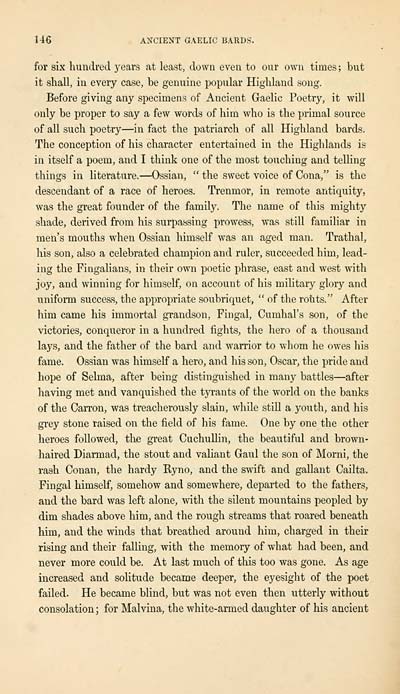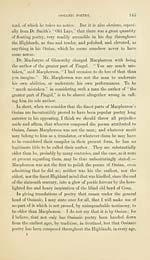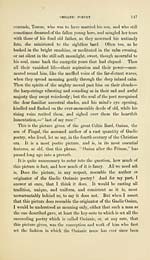Download files
Complete book:
Individual page:
Thumbnail gallery: Grid view | List view

146 AXCIENT GAELIC BARDS.
for six hundred years at least, down even to our own times ; but
it shall, in every case, be genuine popular Highland song.
Before giving any specimens of Ancient Gaelic Poetry, it will
only be proper to say a few words of him who is the primal source
of all such poetry — in fact the patriarch of all Highland bards.
The conception of his character entertained in the Highlands is
in itself a poem, and I think one of the most touching and telling
things in literature. — Ossian, " the sweet voice of Cona," is the
descendant of a race of heroes. Trenmor, in remote antiquity,
was the great founder of the family. The name of this mighty
shade, derived from his surpassing prowess, was still familiar in
men's mouths when Ossian himself was an aged man. Trathal,
his son, also a celebrated champion and ruler, succeeded him, lead-
ing the Fingalians, in their own poetic phrase, east and west with
joy, and winning for himself, on account of his military glory and
uniform success, the appropriate soubriquet, " of the routs." After
him came his immortal grandson, Fingal, Cumhal's son, of the
victories, conqueror in a hundred fights, the hero of a thousand
lays, and the father of the bard and warrior to whom he owes his
fame. Ossian was himself a hero, and his son, Oscar, the pride and
hope of Selma, after being distinguished in many battles — after
having met and vanquished the tyrants of the world on the banks
of the Carron, was treacherously slain, while still a youth, and his
grey stone raised on the field of his fame. One by one the other
heroes followed, the great Cuchullin, the beautiful and brown-
haired Diarmad, the stout and valiant Gaul the son of Morni, the
rash Conan, the hardy Ryno, and the swift and gallant Cailta,
Fingal himself, somehow and somewhere, departed to the fathers,
and the bard was left alone, with the silent mountains peopled by
dim shades above him, and the rough streams that roared beneath
him, and the winds that breathed around him, charged in their
rising and their falling, with the memory of what had been, and
never more could be. At last much of this too was gone. As age
increased and solitude became deeper, the eyesight of the poet
failed. He became blind, but was not even then utterly without
consolation ; for Malvina, the white-armed daughter of his ancient
for six hundred years at least, down even to our own times ; but
it shall, in every case, be genuine popular Highland song.
Before giving any specimens of Ancient Gaelic Poetry, it will
only be proper to say a few words of him who is the primal source
of all such poetry — in fact the patriarch of all Highland bards.
The conception of his character entertained in the Highlands is
in itself a poem, and I think one of the most touching and telling
things in literature. — Ossian, " the sweet voice of Cona," is the
descendant of a race of heroes. Trenmor, in remote antiquity,
was the great founder of the family. The name of this mighty
shade, derived from his surpassing prowess, was still familiar in
men's mouths when Ossian himself was an aged man. Trathal,
his son, also a celebrated champion and ruler, succeeded him, lead-
ing the Fingalians, in their own poetic phrase, east and west with
joy, and winning for himself, on account of his military glory and
uniform success, the appropriate soubriquet, " of the routs." After
him came his immortal grandson, Fingal, Cumhal's son, of the
victories, conqueror in a hundred fights, the hero of a thousand
lays, and the father of the bard and warrior to whom he owes his
fame. Ossian was himself a hero, and his son, Oscar, the pride and
hope of Selma, after being distinguished in many battles — after
having met and vanquished the tyrants of the world on the banks
of the Carron, was treacherously slain, while still a youth, and his
grey stone raised on the field of his fame. One by one the other
heroes followed, the great Cuchullin, the beautiful and brown-
haired Diarmad, the stout and valiant Gaul the son of Morni, the
rash Conan, the hardy Ryno, and the swift and gallant Cailta,
Fingal himself, somehow and somewhere, departed to the fathers,
and the bard was left alone, with the silent mountains peopled by
dim shades above him, and the rough streams that roared beneath
him, and the winds that breathed around him, charged in their
rising and their falling, with the memory of what had been, and
never more could be. At last much of this too was gone. As age
increased and solitude became deeper, the eyesight of the poet
failed. He became blind, but was not even then utterly without
consolation ; for Malvina, the white-armed daughter of his ancient
Set display mode to: Large image | Transcription
Images and transcriptions on this page, including medium image downloads, may be used under the Creative Commons Attribution 4.0 International Licence unless otherwise stated. ![]()
| Early Gaelic Book Collections > Ossian Collection > Selections from the Gaelic bards > (170) |
|---|
| Permanent URL | https://digital.nls.uk/78071895 |
|---|
| Description | Selected books from the Ossian Collection of 327 volumes, originally assembled by J. Norman Methven of Perth. Different editions and translations of James MacPherson's epic poem 'Ossian', some with a map of the 'Kingdom of Connor'. Also secondary material relating to Ossianic poetry and the Ossian controversy. |
|---|
| Description | Selected items from five 'Special and Named Printed Collections'. Includes books in Gaelic and other Celtic languages, works about the Gaels, their languages, literature, culture and history. |
|---|

